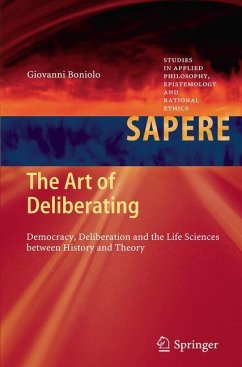How many citizens take part in moral and political decisions concerning the results obtained by the contemporary life sciences? Should they blindly follow skilled demagogues or false and deceptive leaders? Should they adhere to the voice of the majority, or should they take a different decisional path? Deliberative democracy answers these questions, but what is deliberative democracy? Can we really deliberate if we are completely ignorant of the relevant issue? What about ethical or political expertise, is it strictly necessary? Finally, and most significantly, can a deliberative process take place if we ignore the techniques governing it; that is, the techniques required to be minimally skilled in rational argumentation?
Giovanni Boniolo goes back to the historical and theoretical foundations of deliberation showing us, with some irony, that deliberation is a matter of competence, and not just a matter of a right to decide. His conclusion might not delight everyone: "anyonewho is not sufficiently acquainted with the subject matter or lacks the sufficient deliberative competence ought not be admitted to deliberative discussions. This restriction makes both good deliberation and a proper deliberative democracy possible, otherwise debate degenerates into demagogy and hypocrisy".
Giovanni Boniolo goes back to the historical and theoretical foundations of deliberation showing us, with some irony, that deliberation is a matter of competence, and not just a matter of a right to decide. His conclusion might not delight everyone: "anyonewho is not sufficiently acquainted with the subject matter or lacks the sufficient deliberative competence ought not be admitted to deliberative discussions. This restriction makes both good deliberation and a proper deliberative democracy possible, otherwise debate degenerates into demagogy and hypocrisy".








